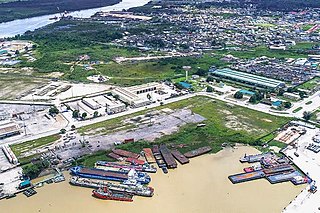
The city of Warri is an oil hub within South-South Nigeria and houses an annex of the Delta State Government House. Warri City is one of the major hubs of the petroleum industry in Nigeria. Warri and her twin city, Uvwie are the commercial capital of Delta State with a population of over 311,970 people in 2006. The city is the indigenous territory of Urhobo, itsekiri and Ijaw people.
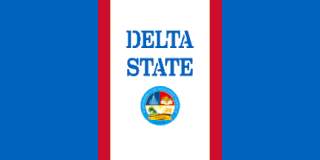
Delta State is a state in the South-South geopolitical zone of Nigeria. Named after the Niger Delta—a large part of which is in the state—the state was formed from the former Bendel State on August 27, 1991. Bordered on the north by Edo State, the east by Anambra and Rivers States, and the south by Bayelsa State while to the west is the Bight of Benin which covers about 160 kilometres of the state's coastline. The State was initially created with 12 local government areas in 1991 which was later extended to 19 and now has 25 local government areas. Asaba as its state capital is located along the River Niger on the northeastern end of the State, while the state's economic centre is the twin cities of Warri and Uvwie
Isoko North is one of two Local Government Areas (LGA) in the Isoko region of Delta State, southern Nigeria – the other being Isoko South. The population of Isoko North was approximately 112,000 as of 2003. Its headquarters are in the town of Ozoro which has 14,000 seater capacity Olympic size stadium at the Delta State Polytechnic Ozoro. There are 13 Electoral Wards in the Local Government Area. Major towns in Isoko North are Ozoro, Owhelogbo, Otor Owhe, Oghara-Iyede and Emevor. The people are mostly Christian and traditional worshippers. Isoko North contains oil producing regions, and is the location of some of the recent conflict in the Niger Delta.

The Niger Delta is the delta of the Niger River sitting directly on the Gulf of Guinea on the Atlantic Ocean in Nigeria. It is located within nine coastal southern Nigerian states, which include: all six states from the South South geopolitical zone, one state (Ondo) from South West geopolitical zone and two states from South East geopolitical zone.
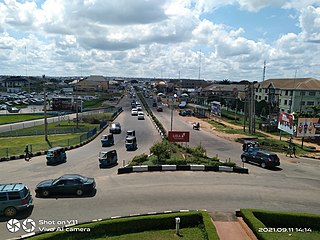
Asaba is the capital city of Delta State, Nigeria. It is located at the western bank of the Niger River, in the Oshimili South Local Government Area. Asaba had a population of 149,603 as at the 2006 census, and a metropolitan population of over half a million people.
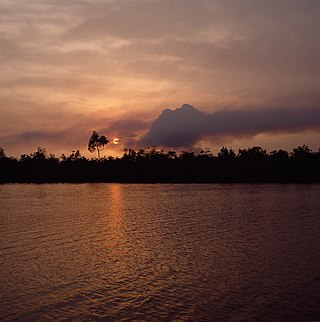
Bayelsa is a state in the South South region of Nigeria, located in the core of the Niger Delta. Bayelsa State was created in 1996 and was carved out from Rivers State, making it one of the newest states in the federation. The capital, Yenagoa, is susceptible to high risk of annual flooding. It shares a boundary with Rivers State to the East and Delta State to the west, with the waters of the Atlantic Ocean dominating its southern borders. It has a total area of 10,773 square kilometres (4,159 sq mi). The state comprises eight local government areas: Ekeremor, Kolokuma/Opokuma, Yenagoa, Nembe, Ogbia, Sagbama, Brass and Southern Ijaw. The state is the smallest in Nigeria by population as of the 2006 census, as well as one of the smallest by area. Being in the Niger Delta, Bayelsa State has a riverine and estuarine setting, with bodies of water within the state preventing the development of significant road infrastructure.

Ughelli is a town in Delta State, Nigeria, and one of the 24 kingdoms that make up the Urhobo Nation. It also serves as the headquarters of Ughelli North local government area of Delta State. The city is indigenous to the Urhobo ethnic nationals, but there is a mixture of several other tribes from the country, such as the Igbos, Edos and others. It is an industrial and agricultural spot of Delta State.

Nigeria has 774 local government areas (LGAs), each administered by a local government council consisting of a chairman, who is the chief executive, and other elected members, who are referred to as councillors. Each LGA is further subdivided into a minimum of ten and a maximum of twenty wards. A ward is administered to by a councillor, who reports directly to the LGA chairman. The councillors fall under the legislative arm of the local government, the third tier of government in Nigeria, below the state governments and the federal government.

Isoko South is a local government area (LGA) in the Isoko region of Delta State, Nigeria. With its headquarters at Oleh, Nigeria, it is one of the two local governments that make up the Isoko region. The other is Isoko North, which has its headquarters at Ozoro.
Anioma people are a subgroup of the Igbo ethnic group in Delta State, Nigeria. They are made up of communities which span across 9 Local government areas and speak different varieties of the Igbo language, including the Enuani language, Ukwuani language, and the Ika-Ibo language. The farther away you go from Onitcha after the Niger bridge and heading towards Agbor and Benin city, the deeper the dialect. They occupy Delta North Senatorial District, which consists of the Enuani (Oshimili/Aniocha), Ika, and Ukwuani/Ndokwa linguistic zones of Delta State.
Isoko is an Edoid language, one of the languages in Delta State spoken by the Isoko people in Isoko South, North and part of Ndokwa East Local Government Areas of Delta State, Southern part of Nigeria in Niger Delta region. It is also spoken in some part of Bayelsa. The Isoko language has close similarities between them and Edo people with other Edoid language because it is an Edoid language,the Isoko people are “an ethnic nationality made up of people and their ancestral roots can be traced through history to the Benin (Aka) kingdom, attested to by the linguistic and cultural similarities that exist between the Isoko people and the Benin (Aka)people” although a few of the Isoko communities or clans have their origins attached to the Ibo language and Urhobo language. Some 750,000 people consider themselves Isoko. Language is a mark of identity and plays an all-important role in the life of a people. The Isoko language however, is being threatened with extinction as reported by Idudhe (2002), as a result of neglect in teaching, learning and use. The Isoko language has about 20 to 21 dialects, but the Aviara/Uzere dialect is the standard dialect of the language.

The Roman Catholic Diocese of Issele-Uku is a diocese located in the city of Issele-Uku, Delta State in the Ecclesiastical province of the Roman Catholic Archdiocese of Benin City, Edo State, Nigeria. It lies on the west bank of the Niger River between Benin City to the west and Onitsha to the east. The diocese comprises six local government areas in the northern portion of Delta State. The Archdiocese of Onitsha borders it on the east and the Archdiocese of Benin City borders it on the west. The Diocese of Uromi is to its north and the Diocese of Warri borders it on the south.

Uvwie (/hu-we-ɛ/), is a principal Urban Local Government Area in Delta State. It lies along the Warri River and it is one of the twenty-four Urhobo Kingdoms. The entirety of the LGA is conurbated with the city of Warri, making it a greater part of Warri metropolitan area
The Oshimili North is one of the twenty-five Local Government Areas that make up Delta State, South-south geo-political region of Nigeria. The Local Government was created in 1997 and until its creation, was part of the old Oshimili Local Government Area. The Local Government is headquartered at Akwukwu-Igbo. Oshimili North is represented by Hon. Pat Ajudua in the Delta State House of Assembly.

Obio-Akpor is a local government area in the metropolis of Port Harcourt, one of the major centres of economic activities in Nigeria, and one of the major cities of the Niger Delta, located in Rivers State. The local government area covers 260 km2 and at the 2006 Census held a population of 464,789. Its postal code or ZIP code is 500102. Obio-Akpor has its headquarters at Rumuodomaya and it is peopled by the Ikwerre
Ohaji-Egbema is an oil-rich Local Government Area of Imo State, Nigeria. Its headquarters is Mmahu-Egbema. Ohaji/Egbema Local Government Area as presently constituted was created by the Gen.Ibrahim B. Babangida’s administration by the August 27, 1991 presidential proclamation, created out of the former Ohaji/Egbema/Oguta L.G.A. Ohaji/Egbema comprises three political districts: Ohaji East, Egbema North, and Ohaji West. The Ohaji-Egbema local Government it has seventeen autonomous communities, namely Egbema, Umuagwo, Oloshi, Umunkwaku, Obile, Obitti, Mgbirichi/Alakuru, Opuoma, Assa, Awarra, Ikwerede, Umuokanne, Obiakpu, Ohaba, Obosima, Mmahu, and Obuomadike.
Senator Ifeanyi Godwin Araraume was born on 16 December 1958 to Late Mr. Marcus Araraume and Mrs. Adaezi Grace Araraume at Isiebu, Umuduru in Isiala Mbano Local Government Area of Imo State, Nigeria.
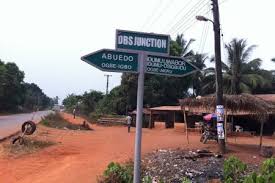
Ubulu-Uku is an Igbo town situated in Aniocha South Local Government Area of Delta State. It shares boundaries with Ogwuashi-Uku to the east, Obior to the west, Isselu-Uku to the north, and Ubulu-Unor to the south. Ubulu-Uku is ruled by HRH Eze Chukwuka Noah Akaeze 1 since 2016. The main occupation of the town is farming with its major produce as cassava, maize, yam, palm produce, cashew, timber, cocoyam, cotton and poultery. The men are expert hunters and palm wine tappers while the women are renowned for their cloth weaving.
Okwuabala is a semi-urban community in Orlu Local Government Area of Imo State, in the Niger Delta region of South Eastern Nigeria. The community shares boundaries with Ogberuru, Mgbe and Amaifeke. The indigenous people of Okwuabala belong to the Igbo ethnic group and the town is situated within the Igbo cultural area. The main language spoken in Okwuabala is the Orsu-Orlu variant of the Igbo language.
The 2023 Delta State gubernatorial election will take place on 18 March 2023, to elect the Governor of Delta State, concurrent with elections to the Delta State House of Assembly as well as twenty-seven other gubernatorial elections and elections to all other state houses of assembly. The election—which was postponed from its original 11 March date—will be held three weeks after the presidential election and National Assembly elections. Incumbent PDP Governor Ifeanyi Okowa is term-limited and cannot seek re-election to a third term.











